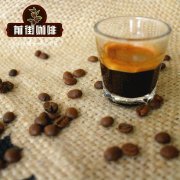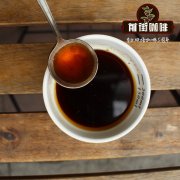Introduction of Old Pine Manor in La Paz District, Honduras Coffee Manor

Professional coffee knowledge exchange more coffee bean information please follow the coffee workshop (Wechat official account cafe_style)
Honduras has always been among the top few in the boutique coffee market, but Honduras has the advantages of natural environment, such as excellent soil quality, altitude and climatic conditions. Nearby Guatemala, El Salvador and Nicaragua also have advanced coffee production. What Honduras lacks is infrastructure and its reputation in the consumer market is not good enough. Hongguo is better known for commercial beans than boutique beans. No matter how good the quality is, there is no way to sell them at a good price. Many beans from Koban and Santa Barbara are mixed with fish eyes as Guatemala beans, and they are sold at the price of Guatemalan beans, and for a long time they are not aware of their own potential for the cultivation of high-quality coffee beans. The main problem is that coffee cherries are only slightly processed. It is sold to the processing plant when it is still wet, which often causes coffee cherries to become moldy and damaged before they are officially dried until the moisture content is only 12%. Such cherries become defective beans after drying. Since there is no relative price return for good quality, coffee farmers, processors and exporters have no incentive or incentive to increase costs to develop the potential for coffee cultivation, so that the end of Honduran coffee beans has become recognized as a mild mixed bean. rather than beans from a single origin or unique farm, this is a vicious circle.
But now it's different, with the help of USAID and Fintrac and several cooperatives like La Central, they try their best to promote and educate Macro bean farmers to produce good coffee, and then properly handle it to maximize the flavor of the final coffee. In addition, the Fair Trade Association (Fair Trade) funded the construction of processing equipment and increased the expertise of coffee farmers to gradually bring Honduran coffee out of the trough. It has become a burgeoning Central American coffee in the past year or two.
Honduras is as diverse as other producing countries, and I can't cover them all in one way. The largest producing area is Santa Barbara Santa Barbara, and there are other producing areas such as Copan Koban, Ocotepeque Ocotepec, Lempira Lompilla, La Paz Baz, and El Paraiso Periso in the south, which are planted at an altitude of 1500 meters to 2000 meters above sea level. Mainly grow extremely high sea beans (SHG) generally speaking, the Honduran coffee we have recently tested has low acidity, high sweetness and obvious caramel flavor, which is an excellent choice for espresso beans.
Avel Mejia worked with his father on a coffee farm in La Paz when he was a child. After getting married, his father gave him a small farm to support his family. Abemesia is not yet 30 years old, but he found that the best way to increase income to support a small family is to improve the quality of coffee and sell it at a better price. He tried his best to improve the quality, learned to take better care of the fruit trees, inspected and managed the manor, and built a scaffolded tanning house (solar house), because only the coffee produced was of excellent quality to attract long-term buyers. He was eager to absorb new knowledge and focused on the fact that the quality of coffee could stand out in the highly competitive coffee competition. He did it for the first time in 2017! Won the national competition!
Abbe Mercia's story not only moves you and me, the important thing is that we can experience delicate juicy, rich white chocolate, cool mint and elegant and delicate vanilla sweetness from his coffee!
Qianjie Coffee is recommended to brew Honduran coffee in 88 degrees water, with chocolate, nut and caramel flavors at the entrance.
Important Notice :
前街咖啡 FrontStreet Coffee has moved to new addredd:
FrontStreet Coffee Address: 315,Donghua East Road,GuangZhou
Tel:020 38364473
- Prev

What is suitable for washing Royal Robusta Coffee in India? is Royal Robusta Coffee good?
Professional coffee knowledge exchange more coffee bean information Please pay attention to the coffee workshop (Wechat official account cafe_style) India has always been one of the most important and special coffee producing countries in the East. In addition to the famous wind-soiled Farmabar coffee beans, India also produces many high-quality alpine Arabica manor-grade beans, as well as rare and exquisite planting, Robbs.
- Next

How to drink the best Honduran coffee in the small Tree Manor in Gongmaya District?
Professional coffee knowledge exchange more coffee bean information please follow the coffee workshop (Wechat official account cafe_style) is located in the mountains 50 kilometers southwest of the town of La Paz, is a dry but cool remote area as the elevation is getting higher and higher, more than 1500 meters above sea level, we see many potential coffee plantations that won the 15-year COE award.
Related
- Does Rose Summer choose Blue, Green or Red? Detailed explanation of Rose Summer Coffee plots and Classification in Panamanian Jade Manor
- What is the difference between the origin, producing area, processing plant, cooperative and manor of coffee beans?
- How fine does the espresso powder fit? how to grind the espresso?
- Sca coffee roasting degree color card coffee roasting degree 8 roasting color values what do you mean?
- The practice of lattes: how to make lattes at home
- Introduction to Indonesian Fine Coffee beans-- Java Coffee producing area of Indonesian Arabica Coffee
- How much will the flavor of light and medium roasted rose summer be expressed? What baking level is rose summer suitable for?
- Introduction to the characteristics of washing, sun-drying or wet-planing coffee commonly used in Mantenin, Indonesia
- Price characteristics of Arabica Coffee Bean Starbucks introduction to Manning Coffee Bean Taste producing area Variety Manor
- What is the authentic Yega flavor? What are the flavor characteristics of the really excellent Yejasuffi coffee beans?

